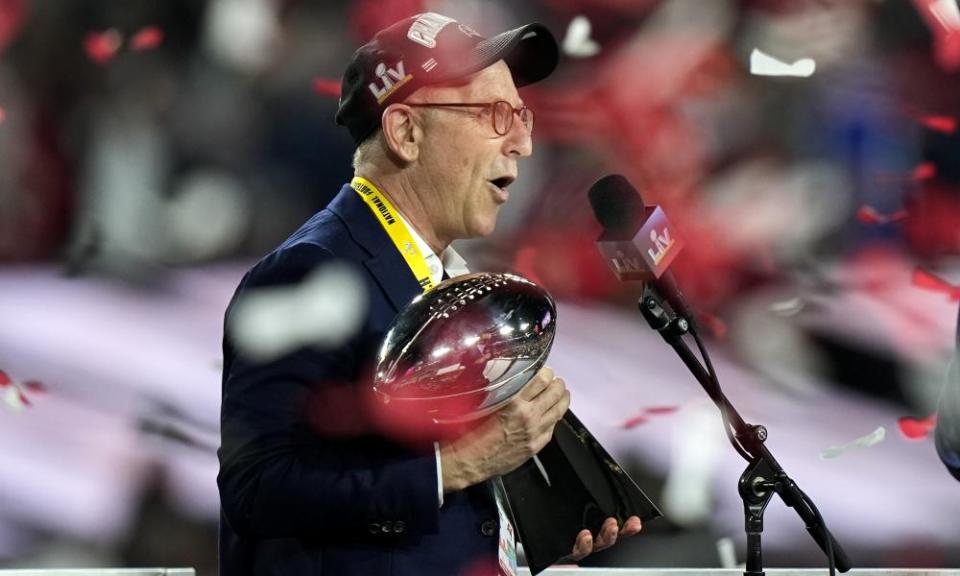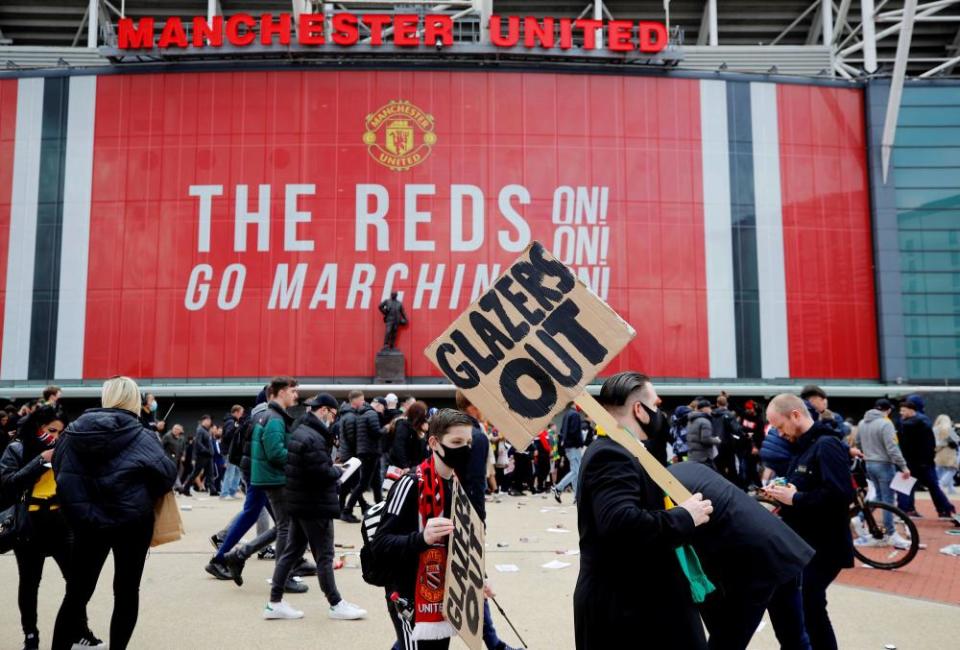Even in Super Bowl-winning Tampa, the Glazers are far from loved

Not that this will make Manchester United fans feel any better, but the Glazers are barely visible in the Tampa Bay too, even though the family has owned the local NFL team since 1995 and won the Super Bowl three months ago (thanks mostly to Tom Brady and a turbocharged defense).
The family frontman, if he can be called that, is Joel Glazer, one of six children of the late Malcolm Glazer. Joel Glazer typically makes himself available to Tampa media only once a year, and although he has a pleasant demeanor, he is hardly expansive on his family’s dealings with the club.
Because of the pandemic, Glazer’s availability to Tampa reporters this year consisted of a 20-minute Zoom call in March. But even in a typical year, four or five news outlets get 10 minutes each with Glazer, and questions about the family’s ownership of Manchester United are off-limits.
Related: Fans saw the Glazers’ money tricks 16 years ago but no one listened | David Conn
This year, keeping in character, he was bland and vague when lobbed softballs about his favorite moment of the Super Bowl season (“It was just more the whole environment,” he said) and about how the roles of the family on the team had changed in recent years. “We all have different areas that we focus on,” he replied, “but it’s a collective effort, a collective organizational effort. No big changes there.” Imagine how ebullient he would have been had the Buccaneers lost the Super Bowl.
Tampa Bay became an American sports centerpiece in the span of four and a half months, with the Lightning winning the NHL’s Stanley Cup last September and the Rays advancing to the World Series in October (and losing to the Dodgers) before the Brady-led Bucs beat Kansas City in Super Bowl LV, the first time a team had won an NFL title in their own stadium.
Someone else besides a Glazer, though, will have to serve as the city’s pitchman. Even in Florida, the Glazers’ way is to get out of the way, which often does not help them.
“I wouldn’t say the Glazers are beloved or hated around there,” John Romano, a sports columnist for the Tampa Bay Times, told the Guardian this week. “I think most people are indifferent toward them because, even 25 years later, the Glazers are still a mystery. And that’s a shame because they took a franchise that was a complete joke and brought two Super Bowl titles to Tampa Bay.”
Supporters of Manchester United, who the Glazers bought in 2005 and immediately saddled with huge debts, do not appear to feel indifferent about the Glazers, judging by the protests last Sunday that led to the postponement of their game against Liverpool. But United fans have never been thrilled about the Glazers’ ownership for several reasons: the Glazers are Americans (or, perhaps more pertinently, not British) who loaded the club with debt and who, just as importantly, have overseen United’s relatively barren Premier League run in recent years from an ocean away.

The Tampa Bay and United situations are different. While United have been one of the biggest clubs in the world for decades prior to the Glazers taking over, the Bucs had 12 straight losing seasons and won the Super Bowl in the eighth season of the family’s ownership. The Bucs later failed to make the playoffs for 12 successive years, but won it all again in February after signing Brady.
Then there is the difference between sports in Europe and the US, where owners uprooting a franchise and moving it to a different city is seen as distasteful rather than inconceivable. US fans often dislike owners – witness New York Mets diehards’ longstanding dispute with the now departed Wilpon family – but they rarely erupt into mass protest as they do in Europe.
The European Super League mess, of course, just drove it over the top in Manchester. Public reaction was negative, because the six English clubs involved in the ESL, three of which are owned by Americans and another of which has NFL ties, looked greedy. Even worse, they appeared indifferent to the way British fans feel a sense of ownership of their local teams (if not literally) and apathetic about the cherished English football pyramid, with promotion and relegation.
The idea was abandoned after two tempestuous days. Joel Glazer tried to appear contrite, opening a letter to United fans on 21 April on the club’s website with, “You made very clear your opposition to the European Super League, and we have listened.
We got it wrong, and we want to show that we can put things right.
“Although the wounds are raw and I understand that it will take time for the scars to heal, I am personally committed to rebuilding trust with our fans and learning from the message you delivered with such conviction.”
The message probably would have been better delivered in person, or even in a video. But supporters’ groups were in no mood to forgive Glazer in any case, leading to the chaos at Old Trafford. The fans don’t really know the Glazers because they say they have never met, but that is also a major reason why they want the Glazers to sell the club.
As Tyrone Marshall wrote this week in the Manchester Evening News: “So much of it comes back not just to the way the Glazers have run the club, but the ignorance they’ve shown to supporters and the way they’ve treated them, with contempt.”
The same feeling was present in Tampa. Romano wrote a column in the Tampa Bay Times on Wednesday about the Glazers and Manchester United that included the passage: “British fans are not accustomed to owners calling the shots without engaging fans or at least pretending to listen to their suggestions and complaints. Honestly, it’s remarkable that the Glazers have spent 15 years there without figuring this out. It speaks to a remarkable level of either cluelessness or arrogance.”
Related: American fans love European football precisely because it isn’t like US sport
The Glazers are still mostly invisible in Tampa Bay, although veteran journalist Ira Kaufman of joebucsfan.com told the Guardian they are active in community projects. As for the running of the team, they are low-key there too.
“While the family doesn’t interfere with football operations on a daily basis, the Glazers traditionally lead the search for a new head coach,” said Kaufman. “They also weigh in on significant decisions like the signing of Tom Brady or improvements to Raymond James Stadium. Joel and Bryan Glazer attend every Bucs game, home and away.
But then Kaufman cut to the bottom line: “Some Bucs fans believe the acquisition of Manchester United diverted some of the family’s focus and financial resources from the [Bucs] franchise. That view was reinforced during the club’s 12-year playoff drought, but the Super Bowl triumph has silenced Glazer skeptics here, at least for the moment.”
If last Sunday’s scenes are anything to go by, keeping United fans quiet will be a trickier task.

